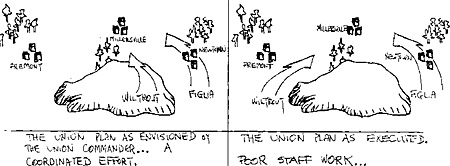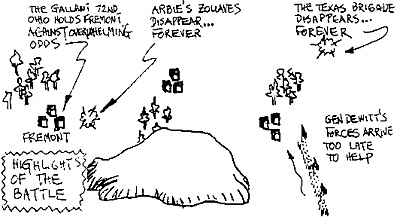During a recent Saturday at the Simon household, four of us sat down to try a new set of rules. Unlike most sets, this particular one was not written by Wally. Instead, Jack Culverson was the author. At once it was easily apparent that Jack had gamed with Wally on many occasions. The infamous 70% rule was included in the rules, and each commander had a certain number of points to use to assist his troops in various ways. They could help bolster morale, add benefits into melee, help the mailmen deliver letters in the snow, etc. Every point was useful.
The unique feature in Jack's rules was in the use of his increment cards. Each division commander was rated either aggressive, bold, average, poor, or cowardly. The increment card gave each commander type a number of increments from 1 to 4.
![]() After each number was either a "+" or a "-". If a "+" followed your commander's type then that commander's units could advance to his objective, fire, or take any offensive action. If the number was followed by a "-", then the units under that commander would retreat from their objective or the nearest enemy unit. The card looked something like this;
After each number was either a "+" or a "-". If a "+" followed your commander's type then that commander's units could advance to his objective, fire, or take any offensive action. If the number was followed by a "-", then the units under that commander would retreat from their objective or the nearest enemy unit. The card looked something like this;
Aggressive Commanders tended to have more increments and fewer "-"s than lower rated commanders. For a cowardly commander, 9 of 20 cards had a minus. For poor commanders, it was 7. I happened to have a poor commander in charge of one of my brigades and thus could assume that 35% of the time he would be retreating from the action. My other brigade commander, the brave Col. Hubig, was rated bold. My opponents' commanders were all rated bold or better. The division commanders were rated on the same scale, but they did not affect the movement of the brigades. Colonel Brillbuster, the man in charge of my division, was rated average. It was a highly exceptional average rating, though.
Jack informed us that each hill held was worth 2 victory points, Freemont and Newtown were also worth 2 victory points, but Millersville was worth 5. Halfway between Millersville and Freemont were some woods. Commander Figlia told me to "hold the line from the woods to the town." As I was standing to the left of the woods, I looked for a town and saw Freemont. As a result, Brillbuster issued orders to both Col. Hubig and Col. Poore to hold the line from Freemont to the woods until General Figlia's attack turned the line. Col. Hubig was to hold the vital town of Freemont, while Col. Poore held the juncture between Figlia's and my men.
 The game began with both the Rebs and Yanks advancing toward each other. I found that three Southern brigades, both of Fred Haub's and one of Wally's, were headed for my division. When I deployed on the second turn, General Figlia calmly asked, "WHAT IN THE WORLD ARE YOU DOING?"
The game began with both the Rebs and Yanks advancing toward each other. I found that three Southern brigades, both of Fred Haub's and one of Wally's, were headed for my division. When I deployed on the second turn, General Figlia calmly asked, "WHAT IN THE WORLD ARE YOU DOING?"
"Defending the line between the town and the woods."
"I meant the woods and THAT town."
"Oh. "I thought you meant this town."
"I did NOT mean THAT town, I meant THAT town."
"Oh."
At this point in time, the Confederate guns started to rain shot and shell on my troops.
As a result, I could not hear Tony informing me which town was what. The 13th Delaware was receiving fire from Wally's Texan battery. Arbie's Zouaves were coming under fire from Fred's Mississippi guns on the hill. My guns were returning fire on both the Texans and the Mississippians. The 13th was forced to fall back from the line, but Arbie's Zouaves held. Wally's Texans surged forward toward the gap in the Union line. The Texans took heavy fire from my guns; fortunately they screened their own guns. One Texas regiment broke early, and another came within canister range of both guns, as well as rifle range of the 9th Delaware. This unit disappeared in the smoke. The third Texan regiment charged the 66th Connecticut holding the woods, and were repulsed by a short range volley.
 On the far left the 72nd Ohio dug into the town of Freemont and started trading fire with the Mississippians. The Louisiana brigade continued to march around to the rear of the town. The Louisiana commander was aggressive and Fred must have figured that he could outmaneuver any Yankee. This continued marching around the flank caused me great concern. The New Yorkers deployed to meet the threat but came under heavy fire from two Louisiana regiments and the guns that they had dragged halfway
around the world. Freemont was assaulted by two Mississippi regiments, but the 72nd held. By this time, Arbie's Zouaves had disappeared under the barrage from the guns on the hill. The 12th New York was in rout, as were the 13th Delaware. Only the 9th and the 66th were still unbloodied, and they were facing the wrong direction and on the wrong end of the line. The artillery batteries were down to the last round of ammo. The 72nd was badly worn down and now faced four fresh Southern regiments, as well as two other Southern regiments that were also worn down.
On the far left the 72nd Ohio dug into the town of Freemont and started trading fire with the Mississippians. The Louisiana brigade continued to march around to the rear of the town. The Louisiana commander was aggressive and Fred must have figured that he could outmaneuver any Yankee. This continued marching around the flank caused me great concern. The New Yorkers deployed to meet the threat but came under heavy fire from two Louisiana regiments and the guns that they had dragged halfway
around the world. Freemont was assaulted by two Mississippi regiments, but the 72nd held. By this time, Arbie's Zouaves had disappeared under the barrage from the guns on the hill. The 12th New York was in rout, as were the 13th Delaware. Only the 9th and the 66th were still unbloodied, and they were facing the wrong direction and on the wrong end of the line. The artillery batteries were down to the last round of ammo. The 72nd was badly worn down and now faced four fresh Southern regiments, as well as two other Southern regiments that were also worn down.
At this point, the voice of the umpire called across the table declaring a Union victory. Tony's two brigades were joined by an oversized brigade commanded by Brian DeWitt. Together they defeated Wally's lone brigade holding that side of the field. Commander Figlia thought that it was an easy victory. Tell it to Arbie's Zouaves.
Back to PW Review March 1994 Table of Contents
Back to PW Review List of Issues
Back to MagWeb Master Magazine List
© Copyright 1994 Wally Simon
This article appears in MagWeb (Magazine Web) on the Internet World Wide Web.
Other military history articles and gaming articles are available at http://www.magweb.com